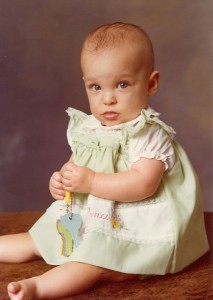When I was a kid, I thought that traveling in something like a time machine would be fabulous. The ability to see history unfold–in my child mind, I was really thinking the ability to change history.
 My brain didn’t comprehend paradoxes. I wanted to go back and see myself as a baby (see cute picture on the left). I wanted to go back and kill Hitler before the Holocaust. Go back and prevent the Black Plague.
My brain didn’t comprehend paradoxes. I wanted to go back and see myself as a baby (see cute picture on the left). I wanted to go back and kill Hitler before the Holocaust. Go back and prevent the Black Plague.
It wasn’t until I read other works of science fiction that I understood the problems with such ideas. What’s funny is that it never even occurred to me to see the future—my mind was caught up in fixing the past.
When I first read The Time Machine by H. G. Wells, I questioned why the main character goes to the future, instead of the past as I would have done. The book went a bit over my head, but I still managed to associate the Eloi with the “haves” and the Morlocks with the “have-nots” or the “working class.” Growing up poor, I was very aware of the fact that many of the kids around me sported Guess Jeans and Ray-Ban sunglasses while I was lucky to have new shoes.
The Time Machine didn’t impact me in any profound ways other than to encourage my imagination as I thought about time travel and where I would go. As a kid, I wanted to go back to the time of Jesus and see if he really was alive and crucified, not to mention whether or not he rose from the dead. Knowing definitively the answer to that would certainly be interesting!
Whether time travel was possible or not, it was another book added to my collection of favorites. Now it’s a reminder of all the possibilities in the future!

Want to read other Flashback Fridays? Click here to see the list in this series.

